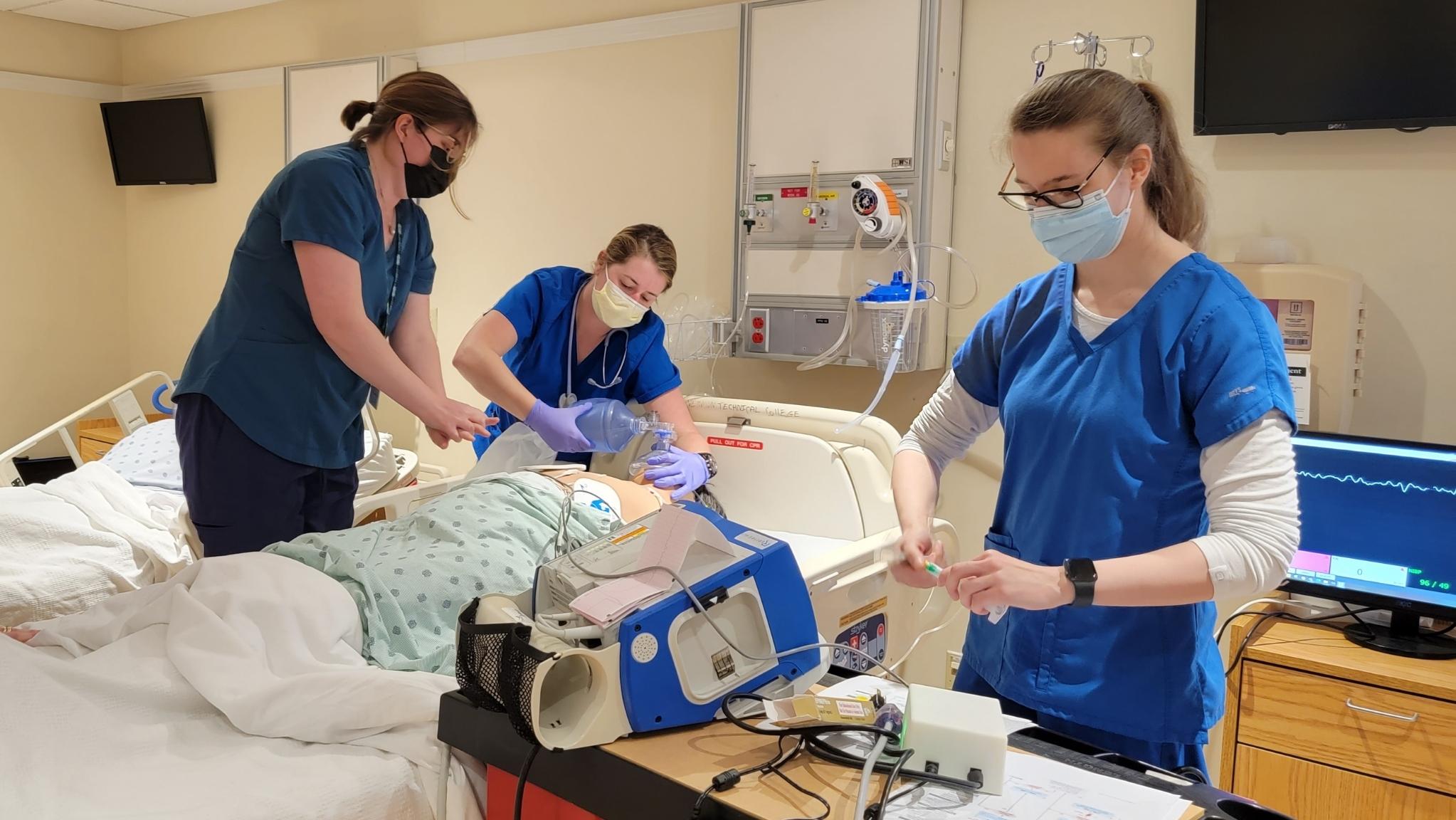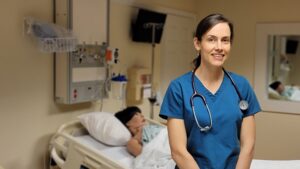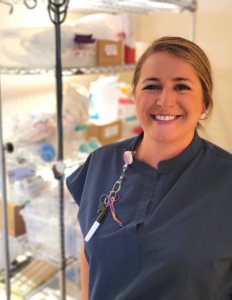
Not only is Gifford committed to keeping our community safe, but it is also our responsibility to make sure our nurses and nursing students continue to get the very best education. One way Gifford does this is through the simulation lab on our Randolph campus in partnership with Vermont Technical College (VTC), soon to be renamed Vermont State University.
 For Cassidy Metcalf, the VTC Sim Lab at Gifford was a crucial part of her education as a nursing student. This was especially true during the pandemic because as Cassidy explains, “We weren’t having supervised interactions with patients (clinicals) anymore, but we could come here and practice by being put into the very same situations we were learning about in books. The sim lab is also a great resource for keeping skills sharp. It’s exciting that Gifford has this resource for both nursing students, new grad nurses and experienced nurses who need to just stay up on their skills.”
For Cassidy Metcalf, the VTC Sim Lab at Gifford was a crucial part of her education as a nursing student. This was especially true during the pandemic because as Cassidy explains, “We weren’t having supervised interactions with patients (clinicals) anymore, but we could come here and practice by being put into the very same situations we were learning about in books. The sim lab is also a great resource for keeping skills sharp. It’s exciting that Gifford has this resource for both nursing students, new grad nurses and experienced nurses who need to just stay up on their skills.”
The Simulation Lab at Gifford is set up just like a hospital room. There’s a patient equipped with technology that allows for interaction. The patient has LED eyes, speaks, has vital signs and breathes. You can take the patient’s blood pressure and heart rate, which can change at any time. Usually, VTC’s Simulation Program Director, Michelle Stearns, is manipulating the situation behind a two-way mirror. She can present a challenging scenario that will create a good learning situation.
According to Cassidy, “It starts kind of slow and then escalates. These are real-life situations that you don’t experience every day, like a code blue. It’s really great to go through it in a safe environment, where it’s okay to make mistakes and you can ask questions.”
 For Quinn McDonagh, enrolling at VTC meant she could jump right into clinical work. In many programs at other colleges, you study and listen to lectures before transitioning into clinical experience. “Especially as someone who did not have a background in the health care field,” Quinn says. “It was very beneficial for my education to get the hands-on experience and to be part of a team.”
For Quinn McDonagh, enrolling at VTC meant she could jump right into clinical work. In many programs at other colleges, you study and listen to lectures before transitioning into clinical experience. “Especially as someone who did not have a background in the health care field,” Quinn says. “It was very beneficial for my education to get the hands-on experience and to be part of a team.”
There is a whole section of your education at VTC where you spend a couple of weeks at the simulation lab going through many different scenarios and as Quinn explains, “Once you get used to it, you forget you’re in a simulation. When you’re in that moment, it feels so real. You’re trying to save your patient.”
After the scenario is complete in the simulation lab, a debrief takes place where the various handlings of the situations are discussed: What did they do right? What did they do wrong? How could they have made care a little bit more efficient?
Both Cassidy and Quinn decided to pursue their nursing careers at Gifford following graduation from VTC. Cassidy, a 2021 graduate, says there were so many kind people willing to help her out as a new nurse. “I just felt so nurtured and like I had the support system I needed to excel and feel comfortable. It is difficult to be a new nurse and you need a lot of support and you need to ask questions and feel safe and comfortable in what you’re doing.”
Quinn, a 2022 graduate, ended up pursuing a career at Gifford because, “I really, really loved the environment. I enjoyed how all of the nursing staff welcomed me with open arms. I probably would not have found Gifford had I not been at the Randolph campus of VTC. I look forward to continuing my education here.”
Gifford offers a Nurse Residency Program, a year-long program allowing first-year nurses to transition from the classroom to the bedside with confidence. It starts with a 12-16-week orientation followed by a year-long residency program working closely with Nurse Educators. It’s designed to allow nurses to discover the potential and possibilities of their careers. For more information on the Nurse Residency Program cal (802) 728-2248 or go to www.giffordhealthcare.org/careers.

